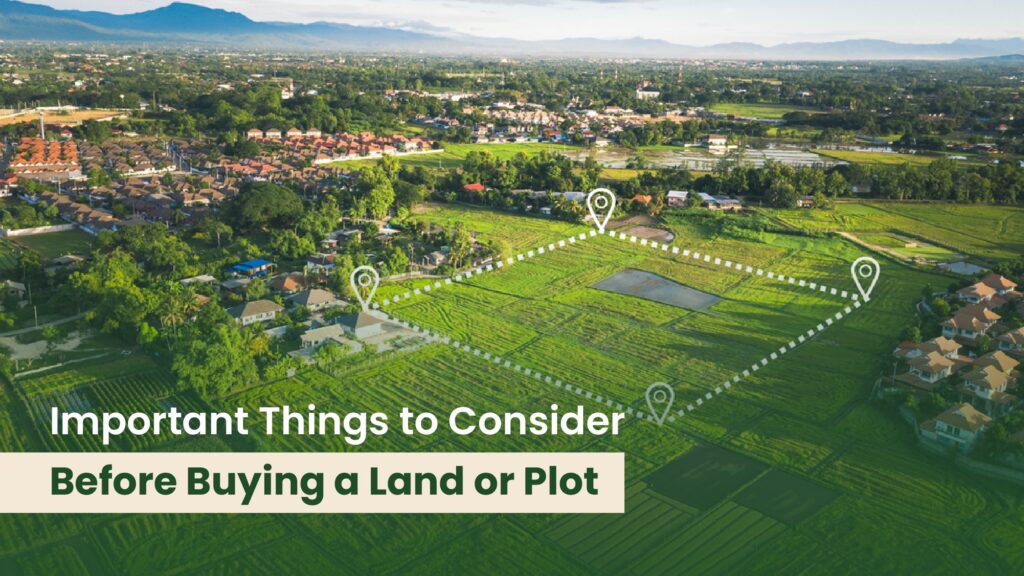
What should I check before buying a land or plot?
Investing in a plot is one of the most significant financial decisions one can make. Whether you are looking at residential land for sale to build your dream house or commercial land for sale for future businesses, there are multiple crucial factors to consider before closing the deal.
Often buying a plot requires extra attention to detail, as you will be investing a lot of money. Knowing what to ask for and what to look for before buying a plot is important to avoid future complications or any disputes. This blog will guide you through all the essential checkpoints before buying land, ensuring a secure and beneficial investment.
What to Check Before Buying a Plot or Land?
Here’s a quick checklist of what you must verify before buying land or a plot:
- Purpose of the land (residential or commercial use)
- Clear title deed and legal ownership
- Land zone classification and land use permissions
- Government approvals and required permits
- Location, connectivity, and neighborhood infrastructure
- Plot size, shape, and boundary measurements
- Encroachments or physical discrepancies
- Availability of utilities (water, electricity, sewage)
- Payment of property tax and clearance of dues
- Current market value and resale potential
- Legal verification of documents
By going through this checklist, you can ensure the plots for sale you’re interested in are legitimate and worthwhile investments.
Identify the purpose of buying a land:
The initial step before looking for plots for sale is to know your purpose. Are you planning to build a house, start a business, or keep the land as a long term investment? Based on your intention, you will either look for,
Residential land for sale: Ideal for building personal homes or apartment complexes.
Commercial land for sale: Best suited for shops, offices, warehouses, or other business related activities.
Understanding your goal will help you filter properties more efficiently.
Check the title
A clear and marketable title is non-negotiable when buying land. Make sure the seller has the legal ownership of the property. Request the original title and have it verified by a legal expert. Ensure that the land is free from any legal disputes or complications.
Verify land use zone and classification
Every piece of land is zoned by local municipal authorities. Before finalizing any deal, check the land’s classification:
- Is it categorized under residential, commercial, industrial or agricultural?
- Does the zoning align with your intended use?
For example, a plot that is listed under commercial land for sale cannot be resold for residential purposes without reclassification. Make it a point to check the land use certificate with the authorities related.
Check government approvals and permits
While visiting or reviewing plots for sale, ensure all the approvals are already made,
- Land conversion certificate, if applicable
- Environmental clearance
- Layout plan approval by the local municipal body
- NOC from water, electricity, and sewage departments
Whether you are opting for residential land for sale or commercial land for sale, these permits are essential for smooth construction and future resale.
Evaluate location and connectivity
Location is essential when it comes to choosing or buying land. Look for a plot with good infrastructure and proximity to:
- School and hospitals (for residential buyer)
- Markets and highways (for commercial buyers)
Ensure that the area is well connected with roads, public transport, and has future development potential. The better the location, the higher the appreciation value of your investment.
Examine plot size and dimensions
While browsing plots for sale, pay close attention to the actual size and shape of the plot. Check for:
- Carpet area vs total area
- Frontage and depth
- Road width
- Compliance with local building codes
Irregular or oddly shaped plots may pose construction limitations in the future.
Inspect Encroachments and Physical Verification
Always conduct a physical inspection before buying land. It’s wise to:
- Visit the plot personally
- Measure boundaries
- Verify with nearby property owners
- Physical verification helps to check the land on paper matches the reality on the ground.
Check Access to Utilities
For both residential land for sale and commercial land for sale, availability of basic amenities is essential. Check for:
- Electricity and water connections
- Sewage lines and drainage systems
- Internet and telephone services
Lack of these facilities can increase your development costs significantly.
Verify Property Tax and Other Dues
Communicate with the seller for the latest tax receipts. Make sure there are:
- No outstanding dues or penalties
- Regular tax payments recorded in the local municipal records
This ensures that the plots for sale are legally compliant and prevents future legal issues.
Understand the Market Value and Compare Prices
Before buying land, research the prevailing market rate in the area. Look at the price of multiple plots for sale to compare and ensure you’re not overpaying. Also, consider:
- Future development plans in the locality
- Price trends over the last few years
Check Resale Value and Liquidity
Not all plots are equally marketable. Assess whether the land you are buying has good resale potential. Commercial land for sale generally has higher liquidity than remote or underdeveloped residential plots. Always think long-term before investing.
Buying land is an excellent investment when done right. Whether you’re looking for residential land for sale to build a peaceful home or commercial land for sale for business expansion, each step must be taken with careful evaluation. Don’t be swayed by flashy advertisements. Instead, focus on title clarity, approvals, and location advantages.
If you’re actively searching for verified plots for sale, always work with trustworthy real estate agents and conduct thorough due diligence. A small mistake can lead to years of legal and financial complications.
